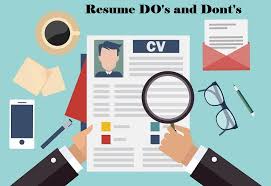
DO
Standard fonts are easily readable. Avoid script and condensed fonts
Use a minimum of 11 or 12 letters
To ensure that your CV fits on A4 paper, and doesn’t lose formatting, print it.
The CV should be formatted so that it appeals to the heart and attracts the attention of the reader.
If you need a template, use it
Start with the most recent and work backwards.
Use punchy sentences, which are easy to understand but convey key accomplishments and confidence.
Take a look at your accomplishments in each position and consider including those that are relevant to your client industry.
Describe what your client can offer to the employer
Your CV is your marketing tool and the only way they can sell you.
A brief section about your interests and hobbies (this will show that you have a life beyond work).
Your email address should be professional and not give off a negative impression. If you feel it is unacceptable, create an email account at yahoo, hotmail, gmail etc with the format of firstname.lastname@.
Double, triple, and check spelling, grammar, and punctuation.
You should make sure your computer’s language is set to English UK, not English US
Be truthful Don’t include any information that you can’t substantiate
Explain the gaps in employment so that people feel reassured or added value
If possible, keep the CV to no more than 2 pages
Reduce industry jargon to an absolute minimum
Use power verbs like ‘implemented, achieved, developed’, and ‘directed’
If you are applying to a specific position, make sure to include your CV.
DON’T
Include a photo
Don’t include any personal information that isn’t necessary, such as your name, religion, home ownership status, or the names of your children.
Don’t rely on your spell-checker. Always double-check grammar and spelling, particularly words like ‘they’, there’, and?whether’.
If you have been made redundant, include reasons why you are leaving your previous jobs.
Referees are an option. These can be provided at a later time if required
Anything that appears misleading, e.g. Include any misleading information, such as a degree without mentioning the grade or where they studied
Humour and sarcasm can be particularly irritating.
Negative things should be included
Give as much information as possible about employment that occurred more than 10 years ago
Use the first person (‘I’ or ‘me’). This can be too informal and seem arrogant.
Describe yourself in third person. “John is a strong negotiator”
Mention your past or current salary
Victoria is a Certified Advanced Resume Writer, and a Professional Employment Coach. She has over 15 years of experience in the areas of CV writing, interview coaching and recruitment. These include working as a Recruiter and Recruitment Manager onsite at Merrill Lynch and Goldman Sachs, two of the largest Investment Banks in the world. Victoria is a skilled interviewer and has reviewed thousands of CVs and conducted interviews for investment banks, big four accountancy firms, stock exchanges and management consultancies. She understands what employers are looking for in a CV and during an interview. Her strength is in her ability draw out relevant experiences and competencies from people and then translate them into winning formats on paper as well as face-to-face. Victoria is a member of CDI (Careers Directors International) and of PARW (the Professional Association of Resume Writers).





